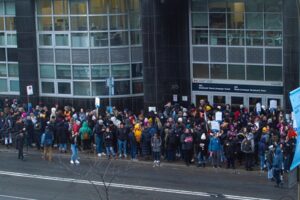“Federals” strike: many inconveniences, but the negotiations do not go ahead
TORONTO – The weight of the hardships increases. The strike by federal civil servants – which shows no signs of ending – is disrupting services across the country, starting with the one relating to passports. “My best advice to Canadians is not to apply for the document at this time because it simply won’t be processed,” said Karina Gould, minister for families, children and social development. “So if you needed that document, they wouldn’t be able to provide it until after the strike action is over,” the minister said in an interview with Eric Sorensen on ‘The West Block Sunday’ broadcast on Global News.
Further, Gould said that while Canadians can still mail their applications or drop them off at a Service Canada office or any passport office, even essential workers aren’t allowed to open and process them, except in very emergency circumstances. restricted. “Unfortunately, by law, passport-related services are not considered essential, so this means that anyone applying for a new passport or renewing one – unless they are in a pre-arranged set of circumstances – will not be able to apply to get the document while the strike is on” Gould explained. The only exceptions are for people who experience humanitarian or emergency situations, such as travel for an economically essential job, medical services abroad, or to see a seriously ill family member or, again, in the event of death in the family, recalled the Gould.
The passport program has already been significantly curtailed due to the work stoppage, which entered its fifth day today, Sunday. Only 500 applications considered urgent or essential were examined on Wednesday when the strike began, the minister said. Very few, if you consider that generally, on a normal day, 20,000 to 25,000 applications for the issuance or renewal of passports are received throughout the country.
Meanwhile, negotiations “continue” – in many quotation marks – between Ottawa and the Public Service Alliance of Canada (PSAC), which represents more than 155,000 federal workers, but the dispute appears to be at an impasse.
On Saturday, PSAC chairman Chris Aylward blamed the federal government for “dragging out this deal” and showing “disrespect” at the negotiating table. He also accused Mona Fortier, the minister in charge of the Treasury Council’s negotiations, of “incompetence”. In response, the Treasury Board released a statement accusing the union of “inflexibility” and said government negotiators had been trying to get through.
Gould in turn reiterated that the government wants to reach an agreement but did not give a specific answer to the question of whether there is a timetable for the possibility for the government to consider legislation on the return to work, i.e. the precept of the workers: “We believe that the best deals are done at the negotiating table and therefore we will continue to put our energies into this” she said, concluding: “I am very confident that the union also wants the same thing and that we can get this agreement so as to minimize the impact on Canadians.”
In the pic above, one of the protests by federal civil servants last week (photo from Twitter – @psac_afpc)



